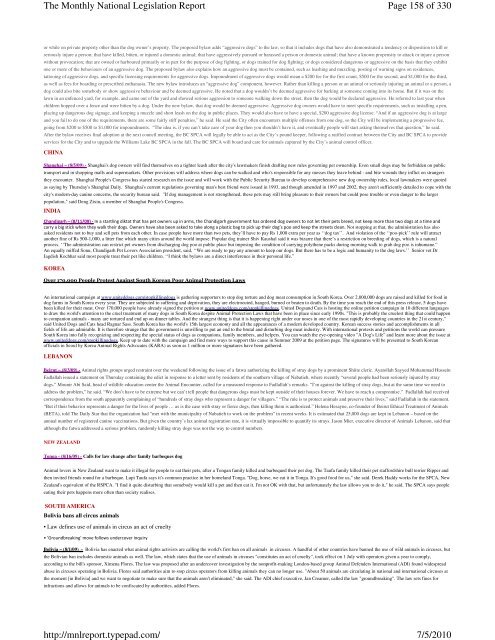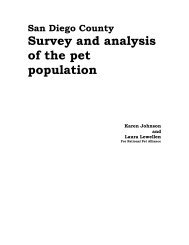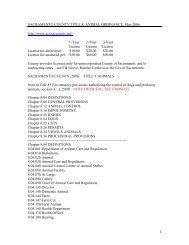Page 1 of 330 The Monthly National Legislation Report 7/5/2010 ...
Page 1 of 330 The Monthly National Legislation Report 7/5/2010 ...
Page 1 of 330 The Monthly National Legislation Report 7/5/2010 ...
Create successful ePaper yourself
Turn your PDF publications into a flip-book with our unique Google optimized e-Paper software.
<strong>The</strong> <strong>Monthly</strong> <strong>National</strong> <strong>Legislation</strong> <strong>Report</strong>http://mnlreport.typepad.com/<strong>Page</strong> 158 <strong>of</strong> <strong>330</strong>7/5/<strong>2010</strong>or while on private property other than the dog owner’s property. <strong>The</strong> proposed bylaw adds “aggressive dogs” to the law, so that it includes dogs that have also demonstrated a tendency or disposition to kill orseriously injure a person; that have killed, bitten, or injured a domestic animal; that have aggressively pursued or harassed a person or domestic animal; that have a known propensity to attack or injure a personwithout provocation; that are owned or harboured primarily or in part for the purpose <strong>of</strong> dog fighting, or dogs trained for dog fighting; or dogs considered dangerous or aggressive on the basis that they exhibitone or more <strong>of</strong> the behaviours <strong>of</strong> an aggressive dog. <strong>The</strong> proposed bylaw also explains how an aggressive dog must be contained, such as leashing and muzzling, posting <strong>of</strong> warning signs on residences,tattooing <strong>of</strong> aggressive dogs, and specific licensing requirements for aggressive dogs. Impoundment <strong>of</strong> aggressive dogs would mean a $200 fee for the first count, $500 for the second, and $1,000 for the third,as well as fees for boarding or prescribed euthanasia. <strong>The</strong> new bylaw introduces an “aggressive dog” component, however. Rather than killing a person or an animal or seriously injuring an animal or a person, adog could also bite somebody or show aggressive behaviour and be deemed aggressive. He noted that a dog wouldn’t be deemed aggressive for barking at someone coming into its home. But if it was on thelawn in an unfenced yard, for example, and came out <strong>of</strong> the yard and showed serious aggression to someone walking down the street, then the dog would be declared aggressive. He referred to last year whenchildren hopped over a fence and were bitten by a dog. Under the new bylaw, that dog would be deemed aggressive. Aggressive dog owners would have to meet specific requirements, such as installing a pen,placing up dangerous dog signage, and keeping a muzzle and short leash on the dog in public places. <strong>The</strong>y would also have to have a special, $200 aggressive dog license. “And if an aggressive dog is at largeand you fail to do one <strong>of</strong> the requirements, there are some fairly stiff penalties,” he said. He said the City <strong>of</strong>ten encounters multiple <strong>of</strong>fenses from one dog, so the City will be implementing a progressive fee,going from $200 to $500 to $1,000 for impoundments. “<strong>The</strong> idea is, if you can’t take care <strong>of</strong> your dog then you shouldn’t have it, and eventually people will start asking themselves that question,” he said.After the bylaw receives final adoption at the next council meeting, the BC SPCA will legally be able to act as the City’s pound keeper, following a ratified contract between the City and BC SPCA to provideservices for the City and to upgrade the Williams Lake BC SPCA in the fall. <strong>The</strong> BC SPCA will board and care for animals captured by the City’s animal control <strong>of</strong>ficer.CHINAShanghai – (8/5/09) - Shanghai's dog owners will find themselves on a tighter leash after the city's lawmakers finish drafting new rules governing pet ownership. Even small dogs may be forbidden on publictransport and in shopping malls and supermarkets. Other provisions will address where dogs can be walked and who's responsible for any messes they leave behind - and bite wounds they inflict on strangersthey encounter. Shanghai People's Congress has started research on the issue and will work with the Public Security Bureau to develop comprehensive new dog ownership rules, local lawmakers were quotedas saying by Thursday's Shanghai Daily. Shanghai's current regulations governing man's best friend were issued in 1993, and though amended in 1997 and 2002, they aren't sufficiently detailed to cope with thecity's modern-day canine concerns, the security bureau said. "If dog management is not strengthened, these pets may still bring pleasure to their owners but could pose trouble or even danger to the largerpopulation," said Deng Zixin, a member <strong>of</strong> Shanghai People's Congress.INDIAChandigarh – (8/11/09) - In a startling diktat that has pet owners up in arms, the Chandigarh government has ordered dog owners to not let their pets breed, not keep more than two dogs at a time andcarry a big stick when they walk their dogs. Owners have also been asked to take along a plastic bag to pick up their dog’s poo and keep the streets clean. Not stopping at that, the administration has alsoasked residents not to buy and sell pets from each other. In case people have more than two pets, they’ll have to pay Rs 1,000 extra per year as ‘‘dog tax’’. And violation <strong>of</strong> the ‘‘poo-pick’’ rule will attractanother fine <strong>of</strong> Rs 500-1,000, a litter fine which many cities around the world impose. Popular dog trainer Shiv Kaushal said it was bizarre that there’s a restriction on breeding <strong>of</strong> dogs, which is a naturalprocess. ‘‘<strong>The</strong> administration can restrict pet owners from discharging dog poo at public place but imposing the condition <strong>of</strong> carrying polythene packs during morning walk to grab dog poo is inhumane.”An equally miffed Sonu, Chandigarh Pet Lovers Association president, said, ‘‘We are ready to pay any amount to keep our dogs. But there has to be a logic and humanity to the dog laws.’’ Senior vet DrJagdish Kochhar said most people treat their pet like children. ‘‘I think the bylaws are a direct interference in their personal life.”KOREAOver 170,000 People Protest Against South Korean Poor Animal Protection LawsAn international campaign at www.uniteddogs.com/stopkillingdogs is gathering supporters to stop dog torture and dog meat consumption in South Korea. Over 2,000,000 dogs are raised and killed for food indog farms in South Korea every year. <strong>The</strong>y are subjected to suffering and deprivation, they are electrocuted, hanged, burned or beaten to death. By the time you reach the end <strong>of</strong> this press release, 5 dogs havebeen killed for their meat. Over 170,000 people have already signed the petition at www.uniteddogs.com/stopkillingdogs. United Dogsand Cats is hosting the online petition campaign in 10 different languagesto draw the world's attention to the cruel treatment <strong>of</strong> many dogs in South Korea despite Animal Protection Laws that have been in place since early 1990s. "This is probably the cruelest thing that could happento companion animals - many are tortured and end up on dinner tables. And the strangest thing is that it is happening right under our noses in one <strong>of</strong> the most rapidly developing countries in the 21st century,"said United Dogs and Cats head Ragnar Sass. South Korea has the world's 15th largest economy and all the appearances <strong>of</strong> a modern developed country. Korean success stories and accomplishments in allfields <strong>of</strong> life are admirable. It is therefore strange that the government is unwilling to put an end to the brutal and disturbing dog meat industry. With international protests and petitions the world can pressureSouth Korea into fully recognizing and respecting the special status <strong>of</strong> dogs as companions, family members, and helpers. You can watch the eye-opening video "A Dog's Life" and learn more about the issue atwww.uniteddogs.com/stopkillingdogs. Keep up to date with the campaign and find more ways to support this cause in Summer 2009 at the petition page. <strong>The</strong> signatures will be presented to South Korean<strong>of</strong>ficials in Seoul by Korea Animal Rights Advocates (KARA) as soon as 1 million or more signatures have been gathered.LEBANONBeirut – (8/3/09) - Animal rights groups urged restraint over the weekend following the issue <strong>of</strong> a fatwa authorizing the killing <strong>of</strong> stray dogs by a prominent Shiite cleric. Ayatollah Sayyed Mohammad HusseinFadlallah issued a statement on Thursday containing the edict in response to a letter sent by residents <strong>of</strong> the southern village <strong>of</strong> Nabatieh, where recently “several people had been seriously injured by straydogs.” Mounir Abi Said, head <strong>of</strong> wildlife education center the Animal Encounter, called for a measured response to Fadlallah’s remarks. “I’m against the killing <strong>of</strong> stray dogs, but at the same time we need toaddress the problem,” he said. “We don’t have to be extreme but we can’t tell people that dangerous dogs must be kept outside <strong>of</strong> their houses forever. We have to reach a compromise.” Fadlallah had receivedcorrespondence from the south apparently complaining <strong>of</strong> “hundreds <strong>of</strong> stray dogs who represent a danger for villagers.” “<strong>The</strong> rule is to protect animals and preserve their lives,” said Fadlallah in the statement.“But if their behavior represents a danger for the lives <strong>of</strong> people … as is the case with stray or fierce dogs, then killing them is authorized.” Helena Hesayne, co-founder <strong>of</strong> Beirut Ethical Treatment <strong>of</strong> Animals(BETA), told <strong>The</strong> Daily Star that the organization had “met with the municipality <strong>of</strong> Nabatieh to work on the problem” in recent weeks. It is estimated that 25,000 dogs are kept in Lebanon – based on theannual number <strong>of</strong> registered canine vaccinations. But given the country’s lax animal registration rate, it is virtually impossible to quantify its strays. Jason Mier, executive director <strong>of</strong> Animals Lebanon, said thatalthough the fatwa addressed a serious problem, randomly killing stray dogs was not the way to control numbers.NEW ZEALANDTonga - (8/16/09) - Calls for law change after family barbeques dogAnimal lovers in New Zealand want to make it illegal for people to eat their pets, after a Tongan family killed and barbequed their pet dog. <strong>The</strong> Taufa family killed their pet staffordshire bull terrier Ripper andthen invited friends round for a barbeque. Lupi Taufa says it's common practice in her homeland Tonga. "Dog, horse, we eat it in Tonga. It's good food for us," she said. Derek Haddy works for the SPCA, NewZealand's equivalent <strong>of</strong> the RSPCA. "I find it quite disturbing that somebody would kill a pet and then eat it. I'm not OK with that, but unfortunately the law allows you to do it," he said. <strong>The</strong> SPCA says peopleeating their pets happens more <strong>of</strong>ten than society realises.SOUTH AMERICABolivia bans all circus animals• Law defines use <strong>of</strong> animals in circus an act <strong>of</strong> cruelty• 'Groundbreaking' move follows undercover inquiryBolivia – (8/1/09) - Bolivia has enacted what animal rights activists are calling the world's first ban on all animals in circuses. A handful <strong>of</strong> other countries have banned the use <strong>of</strong> wild animals in circuses, butthe Bolivian ban includes domestic animals as well. <strong>The</strong> law, which states that the use <strong>of</strong> animals in circuses "constitutes an act <strong>of</strong> cruelty", took effect on 1 July with operators given a year to comply,according to the bill's sponsor, Ximena Flores. <strong>The</strong> law was proposed after an undercover investigation by the nonpr<strong>of</strong>it-making London-based group Animal Defenders International (ADI) found widespreadabuse in circuses operating in Bolivia. Flores said authorities aim to stop circus operators from killing animals they can no longer use. "About 50 animals are circulating in national and international circuses atthe moment [in Bolivia] and we want to negotiate to make sure that the animals aren't eliminated," she said. <strong>The</strong> ADI chief executive, Jan Creamer, called the law "groundbreaking". <strong>The</strong> law sets fines forinfractions and allows for animals to be confiscated by authorities, added Flores.




